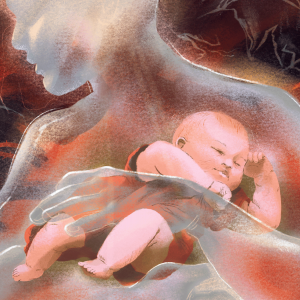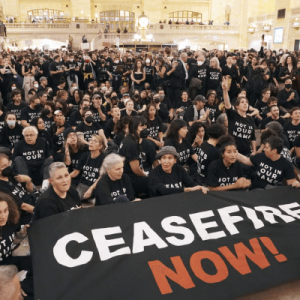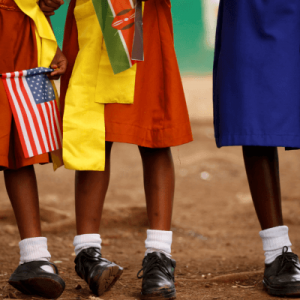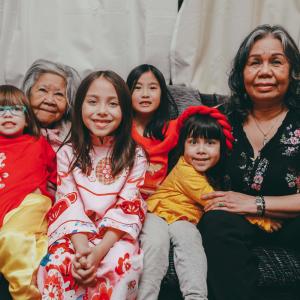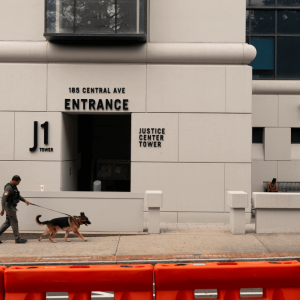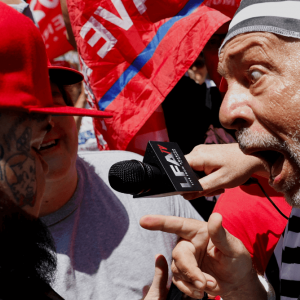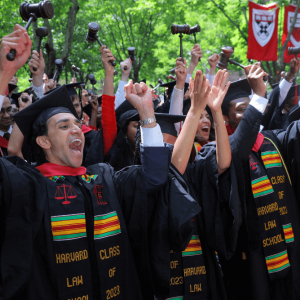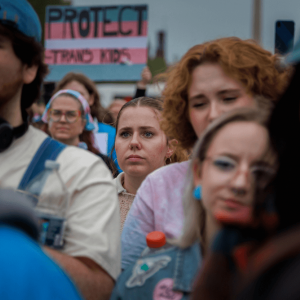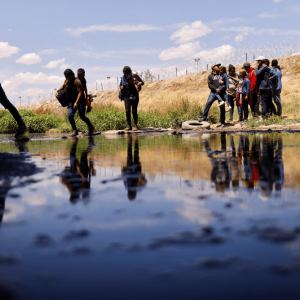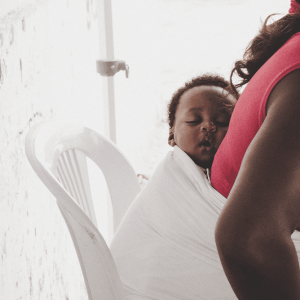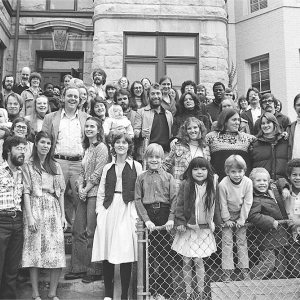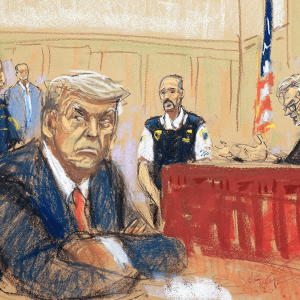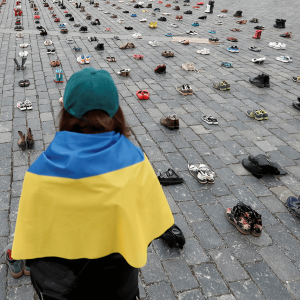
Rev. Adam Russell Taylor is president of Sojourners and author of A More Perfect Union: A New Vision for Building the Beloved Community. Follow him on Bluesky @revadamtaylor.
Taylor previously led the Faith Initiative at the World Bank Group and served as the vice president in charge of Advocacy at World Vision U.S. and the senior political director at Sojourners. He has also served as the executive director of Global Justice, an organization that educates and mobilizes students around global human rights and economic justice. He was selected for the 2009/2010 class of White House Fellows and served in the White House Office of Cabinet Affairs and Public Engagement. Taylor is a graduate of Emory University, the Harvard University Kennedy School of Government, and the Samuel DeWitt Proctor School of Theology. Taylor also serves on the Independent Sector Board, the Global Advisory Board of Tearfund UK, and is a member of the inaugural class of the Aspen Institute Civil Society Fellowship. Taylor is ordained in the American Baptist Church and the Progressive National Baptist Convention and serves in ministry at the Alfred Street Baptist Church in Alexandria, Va.
Speaking Topics
- Human rights and global poverty
- Racial justice
- Voting rights
- Climate justice
- Economic justice
- Immigration
- Peace and nonviolence
- His most recent book, A More Perfect Union: A New Vision for Building the Beloved Community
Speaking Format
- Virtual and in-person events, also available for preaching
Languages
- Fluent in English
Past Notable Events
- Tufts University’s Russell Lecture
- United Church of Christ General Synod Gathering Keynote
- Children’s Defense Fund Staff Retreat Keynote
- Parliament of the World Religions
- Christian Community Development Association Keynote Panel
Posts By This Author
Jesus Had Adverse Childhood Experiences, Too
“It is profoundly significant that Jesus was born not in a secure, two-income household but to an unwed teenage mother.”
I’ll never forget the day my first son was born. Joshua was more than a week late, so my wife’s doctor wanted to induce labor. After a long day of waiting, the nurses convinced me to get a bite to eat because it was likely to be an even longer night. Minutes later, I got a frantic call that my wife, Sharee, was undergoing an emergency cesarean section because Joshua’s heart rate had suddenly plummeted, and his umbilical cord was wrapped around his throat. That day marked the beginning of my journey as a father, the most rewarding and demanding experience of my life. Joshua immediately became the center of our world, as though a huge part of my own heart were living and breathing outside of myself.
The love I feel for my sons is the closest I have felt to God’s unconditional love for everyone. I knew instinctively from the moment I first held my son in my arms that I would do everything possible to ensure that this tiny, fragile person, who was completely dependent on our care, was protected, loved, and able to thrive.
Dear Christians, Cease-Fire Is Not Surrender
Wars, by their very nature, often force people to choose sides and dehumanize the other side to justify violence. We’ve seen the dangers of this binary here in the U.S. as some student groups in support of Palestinian liberation have wrongfully praised or failed to condemn Hamas’ attacks, while some pro-Israeli groups (including many U.S. Christians) have failed to acknowledge the injustice of the ongoing occupation of Palestine and the severe death toll Israel’s response has inflicted on Gazan civilians. Yet while the powers of the world want us to take a side and declare ourselves fully (and exclusively) pro-Israeli or pro-Palestinian, Christian compassion must be freed from favoritism. As peacemakers, we must honor the image of God in every Israeli and every Palestinian.
Christians, Don’t Let Abortion Politics Derail Lifesaving AIDS Work
As is still the case today, bipartisan programs take effort — and bringing PEPFAR to life was no small feat. It required navigating a host of controversial issues such as the use of condoms and perceptions of the disease. It required enlisting the support of social conservatives. It required making an economic, a national security, and a humanitarian argument. It required raising awareness and galvanizing political will.
This Is What a Faith-Based, Pro-Family Agenda Really Looks Like
I’m tired of hearing politicians using “family values” as shorthand for a narrow and often misguided agenda. It is time to broaden and reclaim a truly pro-family agenda to protect and strengthen all families.
6 Warning Signs of Christian Nationalism in US Politics
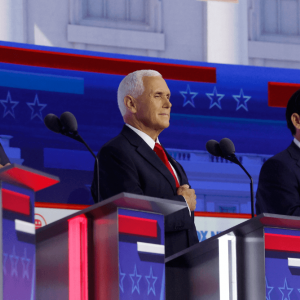
Former New Jersey Gov. Chris Christie, former U.S. Vice President Mike Pence, and Florida Gov. Ron DeSantis hold their hands over their hearts for the U.S. Pledge of Allegiance at the start of at the first Republican candidates' debate of the 2024 U.S. presidential campaign on August 23, 2023. REUTERS/Jonathan Ernst
While there are some extreme politicians like Rep. Marjorie Taylor Greene (R-Ga.) who proudly claim the label, it’s unlikely the top Republican presidential candidates will explicitly embrace Christian nationalism by that name. Instead, voters in the 2024 election will need to be on the lookout for how candidates’ behavior and rhetoric aligns with Christian nationalist ideals and anti-democratic beliefs. Or as Jesus put it: “You will know them by their fruits” (Matthew 7:16).
Invest in the Earth, Not Fossil Fuels
The church should play a leading role in supporting eco-friendly investing.
A RELATIVELY NEW front in the culture wars is emanating from the realm of finance: the push to increase financial investments that take into account “environmental, social, and governance” considerations. What is known in the finance industry as ESG has grown considerably over the past decade. According to the Global Fossil Fuel Divestment Commitments Database, the amount of wealth divested from fossil fuels worldwide has grown from $52 billion in 2014 to more than $40 trillion last year. But the increased visibility and prominence of ESG investing has triggered a backlash, with at least seven GOP-controlled states enacting anti-ESG policies and 15 others introducing bills to disallow the application of ESG principles in state investments such as pensions.
The anti-ESG push is coming from the usual suspects. Texas is heavily involved, due to the prominence of the fossil fuel industry in the state’s economy. Right-wing groups such as the Heritage Foundation and the American Legislative Exchange Council have also been big promoters of model anti-ESG legislation. West Virginia Attorney General Patrick Morrisey has formed a coalition with more than 20 of his counterparts to challenge the Securities and Exchange Commission’s ability to implement a climate disclosure rule, a case that could end up at the Supreme Court and hobble the executive branch’s ability to interpret and act on congressional statutes. Apparently, many conservative activists and politicians are only champions of the “free market” when it advances their ideological agendas.
Have Christians Stopped Caring About Trump's Indictments?
There’s plenty that concerns me about this latest indictment, including 161 specific acts prosecutors say were intended to obstruct the election, ranging from harassment of election officials to the infamous recorded phone call where Trump tells Georgia’s secretary of state to “find” missing votes. But what’s most bothering me aren’t the details of the indictment; I’m worried that most folks in the U.S., including Christians, are barely paying attention. Meanwhile, Trump remains the front-runner in the the Republican primary, despite the indictments.
When Should Christians Break the Law? Ask Jesus, Not Trump
But while we disobey unjust laws to obey the moral laws we have been given by God, there’s a flip side: When human laws do serve the common good or restrain evil, we should obey them.
The Moral and Religious Argument for Affirmative Action
I’m proud to say that I benefitted from affirmative action. These policies, sometimes called “race conscious admission policies,” allow colleges and universities to address unequal access to educational opportunities by taking different aspects of a student’s background, including race, into account among other admission factors. But even with affirmative action in place, in 1994 I joined fewer than 25 other Black men in a freshman class of over 1,000 students at Emory University.
The Biden Administration Must Do More for Immigrants
When will the government treat this with the urgency it demands?
WHEN WE LOOK at the record numbers of migrants who are seeking refuge and asylum in the U.S. and the deplorable ways they have often been treated, it’s easy to lose faith. The U.S. immigration system seems so hopelessly broken, and hateful rhetoric and bad faith are so abundant among our politicians, that it can often feel as if there’s nothing we can do to fix it. Yet, if we take seriously both the Hebrew scripture command to welcome the stranger and Jesus’ call to treat migrant people as we would treat him (Matthew 25), then we cannot let ourselves succumb to despair or resignation. People who have been forced to leave dangerous conditions in their home countries to seek asylum are depending on us to not give up fighting for a fairer and more humane immigration and asylum system. Sadly, Congress has lacked sufficient political will to pass the sweeping overhaul of our immigration laws that is so sorely needed.
Christians Should Denounce Anti-Trans Laws, Not Write Them
I know some Christians do not fully share my theological convictions about gender and sexuality, but on issues of human dignity and civil rights, the church should be firmly united: Transgender and nonbinary siblings are God’s children made in God’s very image and likeness. Prohibiting lifesaving medical care, tolerating discrimination, or denying someone the ability to use their name is wrong; you cannot deny people those rights because you disagree with their beliefs about gender or sexuality. Christians should be standing in the breach in defense of the full humanity, dignity, and rights of their trans siblings.
Jesus Wants Dignity for Migrants. U.S. Policy? Not So Much.
Let’s be clear: Neither Title 42 nor Biden’s new policies meet the biblical standard of “welcoming the stranger,” which for us includes thousands of migrants at the U.S.-Mexico border seeking refuge from violence and extreme poverty.
Honor All Mothers by Asking Congress for These Protections
The Bible is unequivocal that we are to “honor” and even “revere” our mothers (Exodus 20:12 and Leviticus 19:3). While it’s a commitment that needs more attention than one Sunday each year, Mother’s Day provides a special day in which we should go out of our way to honor our mothers with words and acts of gratitude and love.
God Save Us From Christian Empire
The coronation of King Charles III reminds us of a perpetual temptation for the church.
In a ceremony that CNN describes as “a symbolic coming together of the monarchy, church, and state for a religious ritual,” King Charles III will vow to uphold the law and the Church of England. Justin Welby, the Archbishop of Canterbury and leader of the global Anglican Communion, will then anoint Charles with oil and place a heavy crown on his head. The crowds surrounding Westminster Abbey will chant, “God save the king.”
The Theory of Change That Sustains Sojourners
Half a century later, a lot has changed, but we remain committed to inspiring Christians across every tradition to put their faith into action for justice and peace and strengthening faith-inspired movements for change.
Does the United States Disregard the Health of Its Children?
ENSURING THAT EVERY child can realize their full potential is a civic and faith imperative. Yet millions of children in the United States are having their futures sabotaged due to a lack of care, stimulation, and nutrition between birth and age 3. These three years, often referred to as the period of early child development, or ECD, are the most fragile and formative because most of a child’s brain is developed during this period. During the first few years of life, a child’s brain forms more than a million neural pathways every second and grows to 90 percent of the size of an adult’s brain by age 6. As a result, this period can determine whether a child realizes their full potential. The things young children learn, the experiences they have (and the amount of damaging stress to the brain they suffer), and the love and care (or lack thereof) they receive can all have an outsized impact on their lifelong mental, emotional, and physical health.
During my time working at World Vision and the World Bank, I became passionate about the crisis of ECD in low- and middle-income countries, a cause that remains urgent. However, I have become increasingly convicted about the imperative to also address the child development crisis in the U.S. Tragically, the U.S. is not doing well by its youngest generation, especially when compared to similarly wealthy nations. More than 9 million children in the U.S. face food insecurity, which hampers their healthy brain development, and in the last year, 1 in 7 children experienced child abuse or neglect. Without affordable child care, millions of children become at risk for “adverse childhood experiences” that could lead to debilitating impacts on their health and well-being.
No, Trump's Indictment Isn't Like Holy Week
On Maundy Thursday of Holy Week, we remember how Jesus and his disciples celebrated the Passover meal, transforming it into what we now celebrate as communion. The word “maundy” originates in the Latin mandatum, in reference to the mandate Jesus gives his disciples that night: “A new commandment I give unto you that you love one another” (John 13:34). Just before the meal, Jesus engages in an act of loving service and humility: washing the disciple’s feet.
This selfless act contrasts sharply with the shameful spectacle that has dominated recent news: the indictment and arraignment of former President Donald Trump.
Finding God's Rest in a Season of ‘Blah'
Every year, in the final months of winter before the warmth and longer daylight of spring fully take hold, my spirit needs renewal, sometimes even revival. For others, this season can be characterized by a general sense of malaise or just feeling blah. Daylight saving time never helps. And for those of us in the Northern Hemisphere, this season also falls during the solemn season of Lent.
Negotiating Peace in Ukraine Isn’t Surrender. It’s Christian
As the war in Ukraine enters its second year, Ukrainian citizens are hurting and exhausted. Meanwhile, Russia is mounting a new counter-offensive and Ukraine is restocking weapons from its allies, including the U.S. Hundreds of thousands of soldiers and civilians have been killed and wounded, both Ukrainian and Russian, yet the war grinds on without an end in sight.
How Do We Pray After More Police Violence?
Sometimes our nation and world are so full of injustice, loss, and pain that words fail us and our spirit can find no rest. We don’t even know what to say, how to pray, and where to begin to set right the many things that are so overwhelmingly wrong. The vicious murder of Tyre Nichols feels like one of those moments.
